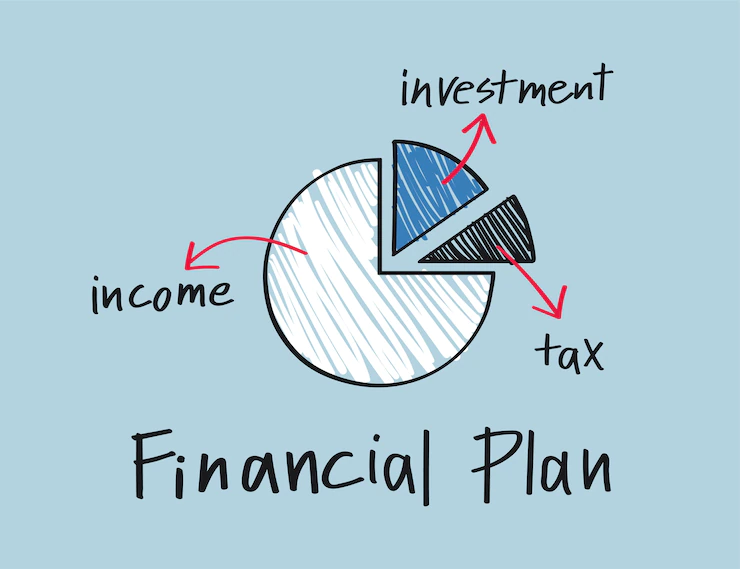What Are The 7 Components Of Financial Planning?
by Abdul Aziz Mondal Finance Published on: 17 June 2022 Last Updated on: 09 November 2024

Financial planning isn’t a top priority for many Americans. Statistics show that only 30% of Americans have a long-term plan for their finances. Does this mean financial planning is not important?
The short answer — financial planning is critical, and your financial health depends on it. When you have a detailed plan for your finances, it becomes easy to meet your bills, save money, and even plan for retirement.
Of course, taking the first financial planning steps can be confusing and intimidating. That is why we have put together the top seven components of financial planning to help you get started.
Why Should You Do Financial Planning?
Financial planning allows you to identify and achieve your goals while also taking care of your current situation. This can be done by developing a budget, creating savings plans, investing in assets, and most importantly, hiring a financial advisor.

There are many reasons why you should plan your finances. It can help you be more confident about your future and make the most of your money. It will also help you save for retirement, manage debt, and prepare for the unexpected.
7 Must-Have Components That Make a Good Financial Plan
A good financial strategy is more than just a document that outlines your goals, it’s an action plan that you can use to achieve them. That is why you must know how to identify parts of a financial plan.
What are the 7 key components of financial planning that you should know about?
Overview:
- Setting Your Goals
- Understanding Your Cash Flow
- Investment Management
- Estate Planning
- Tax Planning
- Risk Management
- Retirement Planning
1. Setting Your Goals
Goal setting is one of the most important components of the financial planning process. Goals should be specific, measurable, and have a time frame attached to them. For example, “I want to buy a house in five years” is better than “I want to save more money.”
Setting goals helps keep your financial journey on track through life’s twists and turns.
2. Understanding Your Cash Flow
Cash flow is another one of the top 7 components of financial planning because it tells you what money is coming in each month and what is going out each month—without fail. If cash flow isn’t in balance with spending habits, it will be impossible to achieve long-term wealth creation goals.
By looking at incoming and outgoing expenses, it’s easier to see what areas of spending need to be cut back or increased.
3. Investment Management
Investment management should be tailored to your particular needs and goals over time. It’s not just about picking stocks and bonds; it’s also about asset allocation, diversification, and minimizing risk while maximizing returns over time.
Financial advisors like Interactive Wealth Advisors, a top financial advisor in Portland, Oregon can help clients manage their investments so they’re invested in the right products at the right time.
4. Estate Planning
Estate planning is also one of the key aspects of financial planning. It involves establishing a will and trust, as well as other legal documents, to ensure that your assets go where you want them to when you’re gone.
These documents allow you to determine how your assets will be distributed upon your death, as well as who should take care of any minor children in the event something happens to both parents.

Financial planning is critical
5. Tax Planning
If you’re not careful about your taxes, Uncle Sam could end up taking more than his fair share from your paycheck.
A good tax strategy helps individuals manage their income tax liability by taking advantage of deductions, and exclusions available under the law. It also helps them reduce their wealth transfer tax liability by providing information about how much money they can give away during life and after death without reducing the amount of money subject to estate tax.
6. Risk Management
Risk management refers to protecting yourself from unexpected events such as accidents or natural disasters by putting aside funds for these types of contingencies so they don’t wipe out everything else.
Gregory Allen, the financial expert from ASAP Finance explains the option of borrowing money online and says “when planning your budget, you should consider your losses and have a plan B in case you don’t have enough savings to cover certain expenses. In this case, looking for other sources of money may be a good idea.” When having such savings (plus financial assistance from lenders) you can cover unexpected expenses and save on your monthly budget.
7. Retirement Planning
Retirement planning is one of the key parts of a financial plan, especially if you’re thinking of retiring soon or are already retired and looking for ways to grow your money while keeping taxes low.
For example, good retirement planning in Oregon will show how much money you’ll need to retire comfortably in Portland and surrounding areas based on your current income level.
How can Interactive Wealth Advisors help?
Financial planning is about more than just making sure you have enough money to meet your retirement needs. It’s also about making sure you have the right amount of money, in the right place, at the right time.

If you’re not sure where to start, or you’ve been putting off the process for a while, Interactive Wealth Advisors can help.
We understand all the financial planning components and take a holistic approach to every situation, which means we study all aspects of your finances—from your income and spending habits to your insurance coverage—so that we can make recommendations based on what’s best for you as an individual.
Our goal is always to give you peace of mind by helping you understand your options and make informed decisions about your future.
Get in touch today and we will explain the steps involved in financial planning, as it affects your unique circumstances.
Additionals:



































































































